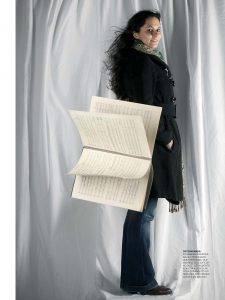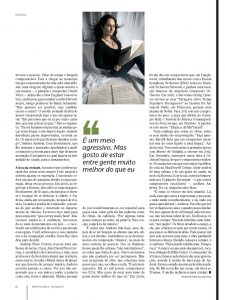Andreia Pinto Correia. Remember this name. (April 2, 2011)
Written by Luciana Leiderfarb
Published by Expresso Magazine
 In Portugal she savors a very discrete anonymity, but it is her work that will open the Contemporary Music festival in New York at the mythic Carnegie Hall. A report of an impressive career that began with jazz.
In Portugal she savors a very discrete anonymity, but it is her work that will open the Contemporary Music festival in New York at the mythic Carnegie Hall. A report of an impressive career that began with jazz.
She has inquietude in her eyes, an easy smile, hands that accompany her talking while the vapor of the tea emerges. The table is covered by notebooks that once opened, reveal the cryptic reality of orchestration. One could confuse it with an ancestral alphabet or with random gibberish. But, she explains, “in the midst of chaos, there is order.” Here and there, an observation written in the margins of a page, an oasis amidst the dense notation, words for what will be later a score, waiting for the day in which it will take on life at the premiere. Andreia Pinto Correia has many premieres in her collection of memories. She has few moments to loiter. She is passing through Lisbon and will leave tomorrow and nothing in her manner indicates the anxiety of one who is about to leave. She has become used to the constant traveling. And she almost likes it.
 She would not have imagined years ago, when asked about her career, that her answer would be ‘composer’. Because music asserted itself via the sounds of a saxophone that she learned how to master at the Academia de Amadores de Música and at the Hot Club School. She started late, “around seventeen, eighteen years of age”. And she did not choose a conventional instrument. While explaining her reasoning – “since I was ten years old, I had this passion for the music of John Coltrane” – she discretely reveals that she behaves this way in everything she does, that she does not merely abandon herself to wondering and mere curiosity.
She would not have imagined years ago, when asked about her career, that her answer would be ‘composer’. Because music asserted itself via the sounds of a saxophone that she learned how to master at the Academia de Amadores de Música and at the Hot Club School. She started late, “around seventeen, eighteen years of age”. And she did not choose a conventional instrument. While explaining her reasoning – “since I was ten years old, I had this passion for the music of John Coltrane” – she discretely reveals that she behaves this way in everything she does, that she does not merely abandon herself to wondering and mere curiosity.
Andreia’s paths are to be followed until the very end, unless exterior forces dictate the opposite. First, it was the saxophone. And jazz. The first plane she boarded for the United States was the result of a scholarship from the Berklee College of Music in Boston. Six months later, a serious accident involving her right arm forced her to come back to Portugal. Goodbye to the saxophone. But not to jazz.
Anchored to Portugal for the next five years, between surgeries and hospital treatments, she taught at the Hot Club School but suspended her studies. She was tied to the routine of what was possible under those conditions, until Boston once again become possible for her: Berklee College would maintain her scholarship and she could follow any major she was willing to choose. “ I was a bit lost, trying to remain focused.” She decided on a film scoring major in order to fix her weaknesses:
 “ That course had the technological aspect associated with the classical music education.” Almost done with her course, she decided to add a second one in jazz composition. In her last semester she writes her first piece “Aljezur”. “ It was a huge success. The college’s orchestra still performs that piece to this day as a concert closer.” Her luck seems to be changing. It is really in jazz that she will build her future. Her next two years confirm this, with her passage through the BMI Composers Workshop in New York.
“ That course had the technological aspect associated with the classical music education.” Almost done with her course, she decided to add a second one in jazz composition. In her last semester she writes her first piece “Aljezur”. “ It was a huge success. The college’s orchestra still performs that piece to this day as a concert closer.” Her luck seems to be changing. It is really in jazz that she will build her future. Her next two years confirm this, with her passage through the BMI Composers Workshop in New York.
Andreia comments on the rain that bombards trees and people outside. To talk about the weather is an understandable diversion. We are arriving at the moment where her life takes a turn. Someone to whom she shows her music – the pianist Danilo Pérez – mentions the New England Conservatory in Boston and Bob Brookmeyer, Maria Schneider’s teacher. “ At the time I did not think it possible, but I applied and I was accepted.” The trained ear of Bob Brookmeyer very soon understood what she vaguely intuits. “ He soon understood that I was not staying in jazz, that I was meant to go on another musical path.” He was not mistaken. “My works were already very orchestral in approach, very extended forms with no place for improvisation. I had this tendency to write everything, down to the smallest detail. Jazz musicians were usually pretty upset for not having any room for improvisation”, Andreia remembers. With Bob Brookmeyer, who was her master’s degree supervisor, Andreia deepened her musical analysis and orchestration skills. And prepared herself, like a caterpillar in the intimacy of its cocoon, for her metamorphosis.
The hour of truth. And so it happens that the natural order of things not always is as natural as we would expect. The master’s suffered a year of interruption due to another surgery, this time on her neck. In 2006, as she returns to Boston, she finds herself at a crossroads: Brookmeyer, now eighty years old, was sick and unable to travel to Boston and Andreia, still recovering from the surgery is unable to visit him.
Forced to change private teachers, the young woman finishes her master’s degree as a student of the classical composition department. She immediately wrote an orchestral work that “went very well”. But, refusing to surrender to the self-evident, she applied for a doctorate in jazz composition – receiving a phone call from the school questioning her choice. The jury thought that she should apply as a concert music composer. She was given five days to think about it.
Andreia Pinto-Correia grew up in a literary house. Her father, João David Pinto-Correia, is a literature professor, her mother a professor of German Literature who translated Goethe and Musil, among others. Before she imagined that one day she would write music, Andreia wrote poetry and short stories. It is not surprising that her music has the word as root, source, and food. Several of her father’s poems transformed themselves into material for her own works, not only through their text but also through their rhythm and cadence. “ For some reason I always think about text, and the importance of the word. I cannot detached it from the musical language.”
This is how Andreia speaks of her music today, years after she hurled herself into the abyss that was after all, her destiny. She applied to the doctoral program in concert music, along with a hundred other people. Of the fourteen finalists, some thought she would not have a chance, knowing that she had a jazz background. Another person thought she would not make it because she was Portuguese. But this elite program, which only admits one person per year, selected her. “ It is an aggressive scene. There are forty thousand composers in the United States. But I do enjoy to be among people that are better than I am at what they do.” In 2009, she was one of six composers who worked with the Boston Symphony Orchestra for two months, she won the National Orchestra Network; and won a honorable mention from the American Composers Orchestra. In 2010, the Borromeo String Quartet premiered her “Variações sobre Temas Populares Portugueses” (Variations on Portuguese Folk Themes) at the Institute for Advanced Study in Princeton for an audience of Nobel prize winners. For 2011 she has an important commission: a work that will open, at Carnegie Hall, the Contemporary Music Festival in October. The work has already a title, “Elegia a Al-Mu’tamid”.
With a catalogue that has fifty works, almost all her titles are in Portuguese. “I think it is important. Bartók used to mention that a composer has to have a relationship with his own language”. Andreia does. She has already plans for her first opera, with libretto by Ondjaki, to be premiered in 2012. In September she will finish another work for the OrchestrUtópica, with whom she is currently composer in residence. At this moment, and while this article is being published, she is a fellow at the MacDowell Colony, where she works while enjoying her solitude in a cottage and a grand piano in the middle of a forest. This place once attended by Copland and Bernstein – and by other established composers – welcomed Andreia. And here we almost do not know anything about it.
“ I feel like I live in two different worlds simultaneously. Over there, where I feel that I am well represented and were I have recognition and over here where things are more complicated”, she confesses. She understands that in a few years the landscape might change. Although she travels to Portugal every three months or so she does not plan to return for good. In Boston she lives for composing. She does not have TV or internet at home by personal choice. Books invade her space and Andreia, who criticized her parents for having so many of them, sees that she is not so different after all. She can live one month without writing a note, the work gaining form inside her head. When she sits down to write, chaos reigns. “I do not even pick up the phone. I disappear.” The only time in which she really wanted to disappear she received Elliott Carter’s blessing in return. The one hundred and two year old composer, famous for the harshness of his criticism, was present at one of Andreia’s premieres. He was seated right in the row behind hers. At the end, he touched her back and she looked back. She trembled. The elder bent forward to give her a kiss.